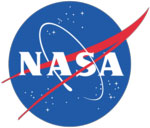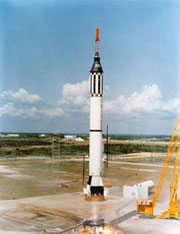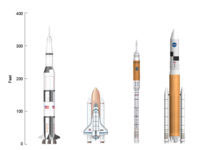影片对白 The readiness is all. You know the players. Call the game.
考考你 乘热打铁
5. Cross one's mind
这个片语也写作pass through one's mind,意思是"Suddenly occur to one突然想起,掠过心头",例如:It never crossed my mind that they would turn the proposal down.
文化面面观
National Aeronautics and Space Administration
美国国家航空航天局简介
National Aeronautics and Space Administration (NASA) is the unit of the federal government charged with operating the nation's space exploration and aeronautics programs. The administrator of NASA, an independent agency, is appointed by the president, subject to Senate confirmation. NASA came into existence on 1 October 1958, after Congress passed the National Aeronautics and Space Act of 1958, at the recommendation of President Dwight D. Eisenhower. Many Americans had been highly alarmed when, on 4 October 1957, the Soviet Union put into orbit Sputnik, the first man-made satellite. In the midst of the Cold War, Americans feared that the Soviets might develop superior missile and space technology and use it against the United States. The new agency absorbed the National Advisory Committee for Aeronautics, a poorly funded research agency formed in 1915.
programs. The administrator of NASA, an independent agency, is appointed by the president, subject to Senate confirmation. NASA came into existence on 1 October 1958, after Congress passed the National Aeronautics and Space Act of 1958, at the recommendation of President Dwight D. Eisenhower. Many Americans had been highly alarmed when, on 4 October 1957, the Soviet Union put into orbit Sputnik, the first man-made satellite. In the midst of the Cold War, Americans feared that the Soviets might develop superior missile and space technology and use it against the United States. The new agency absorbed the National Advisory Committee for Aeronautics, a poorly funded research agency formed in 1915.
Even though much of NASA's early political support stemmed from America's Cold War competition with the Soviet Union, NASA was designed as an explicitly civilian agency to pursue peaceful space activities. Overseeing the military applications of space technology was left to the Department of Defense. In practice, however, the distinction has sometimes blurred. From the beginning, NASA and the military have cooperated in a variety of ways, and many astronauts have come from military backgrounds.
Projects Mercury and Gemini
 |
|
May 5, 1961 launch of Redstone rocket and NASA's Mercury spacecraft #7 Freedom 7 with Alan Shepard Jr. on the United States' first manned sub-orbital spaceflight. (Atlas rockets were used to launch Mercury's orbital missions.)
|
NASA designed its first major program, Project Mercury, to study human abilities in space and to develop the technology required for manned space exploration. The program and the original seven astronauts received tremendous public attention, and the astronauts became national heroes. One of those seven, Alan Shepard, became the first American in space with his suborbital flight on 5 May 1961. On 20 February 1962, John Glenn became the first American to orbit the earth (Soviet cosmonaut Yuri A. Gagarin was the first human in space and the first to orbit the Earth, on 12 April 1961).
President John F. Kennedy congratulated the astronauts and NASA but said that the nation needed "a substantially larger effort" in space. Speaking to Congress on 25 May 1961, Kennedy declared what that effort should be: "I believe that this nation should commit itself to achieving the goal, before this decade is out, of landing a man on the moon and returning him safely to the Earth." Kennedy admitted that the lunar program would be expensive and risky, but the public came to support it enthusiastically. Congress approved the program-called Project Apollo-with very little debate. Apollo became the most expensive civilian project in American history.
The Mercury flights (a total of six from 1961 to 1963) and the subsequent Project Gemini (ten flights from 1965 to 1966) served as preliminary steps to going to the moon. The larger and more advanced Gemini spacecraft allowed astronauts to practice maneuvers that would be essential in the Apollo program.
Project Apollo
Ironically, as NASA worked toward fulfilling its exciting goal, public support for the agency began to decline. After it became clear that the United States was not really
 |
|
Left to Right: Saturn V, which last carried men to the Moon, the Space Shuttle and the planned Ares I and Ares V launch vehicles
|
losing the "space race" to the Soviet Union, many Americans wondered whether the lunar program was worth its cost. Then, on 27 January 1967, three astronauts conducting tests inside a sealed Apollo capsule died when a fire broke out in the spacecraft. A review board found that NASA had not paid adequate attention to safety.
After several unmanned Apollo test flights and one manned mission that orbited the Earth, NASA was ready to send a spacecraft into lunar orbit. Circling the moon on Christmas Eve, 1968, the crew of Apollo 8 beamed back to Earth spectacular pictures of the moon's surface. NASA sent two more test flights into lunar orbit and was then ready to land on the moon. Apollo 11 lifted off on 16 July 1969 and landed on the moon four days later. As much of the world watched televised coverage in awe, Neil Armstrong became the first human to walk on the moon. Just after he stepped from his spacecraft onto the lunar surface, Armstrong spoke his immortal line: "That's one small step for [a] man, one giant leap for mankind." The crew of Apollo 11 returned safely to earth on 24 July.
Apollo 12 made a smooth journey to the moon and back, but the next mission-Apollo 13-encountered serious problems. On the way to the moon in April 1970, one of the spacecraft's oxygen tanks exploded, crippling the ship and leaving doubt whether the crew could return safely. Some ingenious work by the astronauts and the NASA engineers on the ground brought the crew of Apollo 13 home alive. NASA conducted four more successful expeditions to the moon, but dwindling public interest and congressional support led to the cancellation of the final two planned flights.